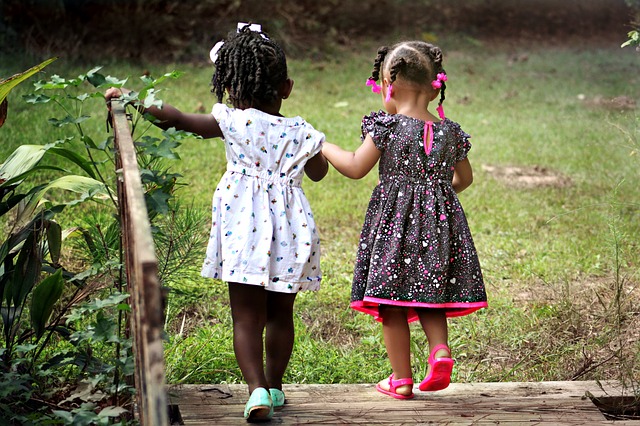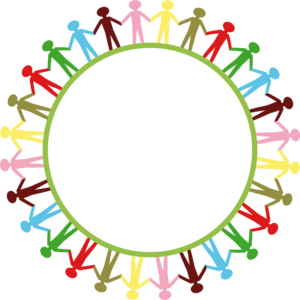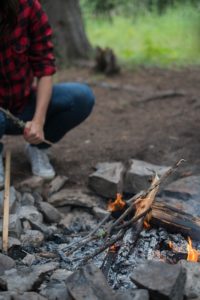The following is a guest blog post by Arvin Paranjpe.
 As a parent with absolutely no experience in teaching or leading kids, I had a crazy but faintly lucid idea: I should start a week-long nonviolence camp for my six year-old daughter.
As a parent with absolutely no experience in teaching or leading kids, I had a crazy but faintly lucid idea: I should start a week-long nonviolence camp for my six year-old daughter.
And so I did—with the help of my wife, several part-time parents, three volunteers, and six wonderful girls ranging from six to nine years old.
I had my reasons to start a nonviolence day camp, which we dubbed The Heart of a Hero Camp. For one, I want my daughter, and all children, to live a life full of peace and love. Gandhi believed that if we are to reach real peace in this world—and if we are to carry on a real war against war—we must begin with our children.
I want our children to draw from the great wisdom traditions, which conclude that we are connected and that living in unity is paramount. I was also hoping to help the campers set their eyes on a goal worthy of them, one far more promising than a life based on sterile moneymaking or the blandishments of selfish living. I wanted to help them to engage in meaningful work that raises the dignity and value of the human being by contributing to initiatives that empower people.
Making a Difference Through a Constructive Project
Our camp implemented an outreach campaign for an important federal, bipartisan bill that will help children at imminent risk of entering the foster system. The outreach campaign centered on collaborating with local children’s book author/artist Mark Olmstead to create coloring sheets. Every day our little campers brainstormed what a particular nonviolence quote meant. We wrote their comments on a chalkboard and asked them to draw out these concepts. We sent these drawings to artist Mark Olmstead to create coloring sheets from them. These coloring sheets that elucidate nonviolence quotes will be distributed to restaurants and schools. On the back of the coloring sheets is a letter informing parents about an important federal bipartisan bill that asks them to send the colored sheet to their senator to support the bill. The bill is supported by more than 130 child rights advocacy groups. In a nutshell, the bill allows relatives of kids at imminent risk of entering the foster system to receive the same financial support and caregiver services as given to foster families. Rather than receiving $300 per month, they’d receive about $1,100 per month on a short-term basis to prevent kids from being placed in the foster system.
The bill will keep children out of dangerous situations typical of group homes through its preventative measures and Qualified Residential Treatment Program. Senator Wyden pointed out that a Texas judge noted troubling findings concerning the state’s group homes:
The U.S. District judge who wrote the decision directed the state to stop placing certain children in unsafe settings such as foster group homes that lack 24-hour supervision. At question was whether group homes should continue to operate at all, given concerns that they cause “an unreasonable risk of harm” to foster children. The Court heard testimony that in foster group homes that mix younger children with older children, sexual abuse “is usual rather than unusual.”
The Family First Prevention Services Act passed by voice vote in the House of Representatives on June 21, 2016 but the bill was not allowed a Senate floor vote before the mid-July adjournment. According to the Chronicle of Social Change website, more than one senator has placed a hold on the bill. No senator has publicly taken responsibility for one.
To help spread the word about this bill and bolster support, please consider downloading this coloring sheet and following the directions on the second page.
The Daily Camp Routine
 Camp would begin at 9 a.m. on a playground. We almost always started with an exhausting game of freeze tag. We’d then huddle up in a tight circle, hold hands and, together as a group, recite this passage from the Rig Veda:
Camp would begin at 9 a.m. on a playground. We almost always started with an exhausting game of freeze tag. We’d then huddle up in a tight circle, hold hands and, together as a group, recite this passage from the Rig Veda:
May we be united in our prayer.
May we be united in our goal.
May we be united in our resolve.
May we be united in our understanding.
May we be united in our offerings.
May we be united in our feelings.
May we be united in our hearts.
May we be united in our thoughts.
May there be perfect unity amongst us.
Then, sitting in our circle, we’d have our daily morning check-in. Each person (child, volunteer, special guest visitor, or parent) would be given a turn to tell the group how they were feeling, what they were looking forward to that day, events they enjoyed recently, or anything else on their minds. Every day I would tell the kids that every person is important and every voice matters. The circle activity was our way of practicing this ethic.
Afterward, we’d sing two peace songs and then transition to story time. The Buddha stories were a big hit, but this bunch loved whatever came their way: Mother Teresa, St. Francis and Brother Wolf, a couple of impromptu stories from my not-so-flattering life. If time permitted and we remembered, we would then sit for meditation. (Mental note on this one: five minutes for six year-olds is generally pushing it.)
In preparation for camp, the parents were asked to pick a mantram for their child. So when we would walk, from time to time we’d encourage the kids to say their mantram. After meditation, we’d walk to a park, say the mantram a bit, let the kids play for about 45 minutes, snack together as a group and then walk back to my house. For an hour, we would turn our attention to a nonviolence quote. First we would read the quote aloud and allow the kids to tell us what they thought it meant and if they could think of any examples that illustrate its core concepts. The kids drew whatever appealed to them with respect to the brainstorming and/or quote. Here were the five gems we used in our camp:
- Margaret Mead: “Never doubt that a small group of thoughtful, committed, citizens can change the world. Indeed, it is the only thing that ever has.”
- Mother Teresa: “Never let anyone come to you without coming away better and happier. Everyone should see goodness in your face, in your eyes, in your smile.”
- Jane Goodall: “What you do makes a difference, and you have to decide what kind of difference you want to make.”
- Buddha: “Conquer anger through gentleness, unkindness through kindness, greed through generosity and falsehood with truth.”
- Gandhi: “Full effort is full victory.”
In the camp, following Eknath Easwaran’s lead, we made a distinction between joy and pleasure. Joy is happiness that we can enjoy that is not at the expense of others. Nature walks, celebrating special occasions together, helping others, caring for animals, and almost all kid play is joyous. Pleasure here refers to private, personal pleasures that satisfy that person but, at best, does nothing for others. Pleasure is not wrong, it just doesn’t necessarily do anything to help others and leaves nothing to hold or build our lives on. Every so often in camp we had the kids jot down in notebooks concepts or activities that brought them joy or that they wondered or marveled about. We called these journals their Joy and Wonder Books. Every kiddo loved them.
Lessons Learned
By and large, I think all of the kids had a blast. With that said, I learned that we as parents and a community at large have much more work to do. Even in our tiny camp, there were threads of discord that would divide the kids. I found it painful to see the way kids would accuse, judge, blame, and rebuff each other. There were subtle behaviors too. In one child, I could see the fear of being ostracized for her previous missteps. In addition, I saw that she tended not to play in a larger group and inadvertently exhibited rude behavior. Most of these not-so-desirable behaviors can create much turmoil and suffering in a person’s life because they tend to sow the seeds of ill will in others, and seeing this in these wondrous kids was saddening to me.
It became clear to me that creating unity amongst these six children was no small task. For almost the entire week, we had three adults in charge of six kids. When turmoil broke out, we could assign one or more adults to one or more kids without difficulty. Invariably, the  appointed grownup would help the tearful child by raising their spirits. Sometimes this meant being a shoulder for them to cry on, other times by simply taking their mind off things with positive energy, and yet other times by digging deep to understand and sympathize with the child and providing them the guidance or reassurance they needed to feel better.
appointed grownup would help the tearful child by raising their spirits. Sometimes this meant being a shoulder for them to cry on, other times by simply taking their mind off things with positive energy, and yet other times by digging deep to understand and sympathize with the child and providing them the guidance or reassurance they needed to feel better.
I spent every hour with the kids and benefited immensely from it. It was like parenting boot camp. If an average playdate spans two hours, then the camp encompassed the equivalent of 17 playdates—and you can learn so much from playing with your kids! During play there are many opportunities to help children grow more considerate, empathic, and friendly. Just like tiger cubs are given leeway to play together and learn immensely from it, we parents too can lighten up around our kids and allow them to play and learn in a non-dogmatic way—completely fluid and relatively care-free.
Thanks to the Heart of a Hero Camp I am a much better father. For I now better understand so many of the difficulties that my daughter faces in social contexts. Consequently, I can keep an eye out for teachable moments and, with compassion steadying my hand, I can gently nudge her with model language in a respectful, agreeable manner.
The last day the kids played together much better, and I truly believe that if this camp were to be held every year, the kids would benefit immensely. The cohesiveness improved so much between the kids that it made me wonder what would happen over the years. They could unite as close, trusted friends and embolden a sense of unity and purpose in many of their peers. Who knows? They may even become beacons of light.
Many parents say they don’t have time to take a week off to run a camp for their children, let alone enough time for them in a regular work week. But maybe the most important takeaway from camp was that we parents must make more time for our children. It was Mother Teresa who drew the connection between extraneous desires, limited time, and its effect on the home: “[E]verybody today seems to be in such a terrible rush, anxious for greater developments and greater riches and so on, so that children have very little time for their parents. Parents have very little time for each other, and in the home begins the disruption of peace of the world.”
I encourage all parents to consider starting their own week-long Heart of a Hero camp for their kids and their friends. I am more than happy to provide my input and guidance on the subject should a parent wish to learn more. Feel free to contact me: aparanj@gmail.com.








